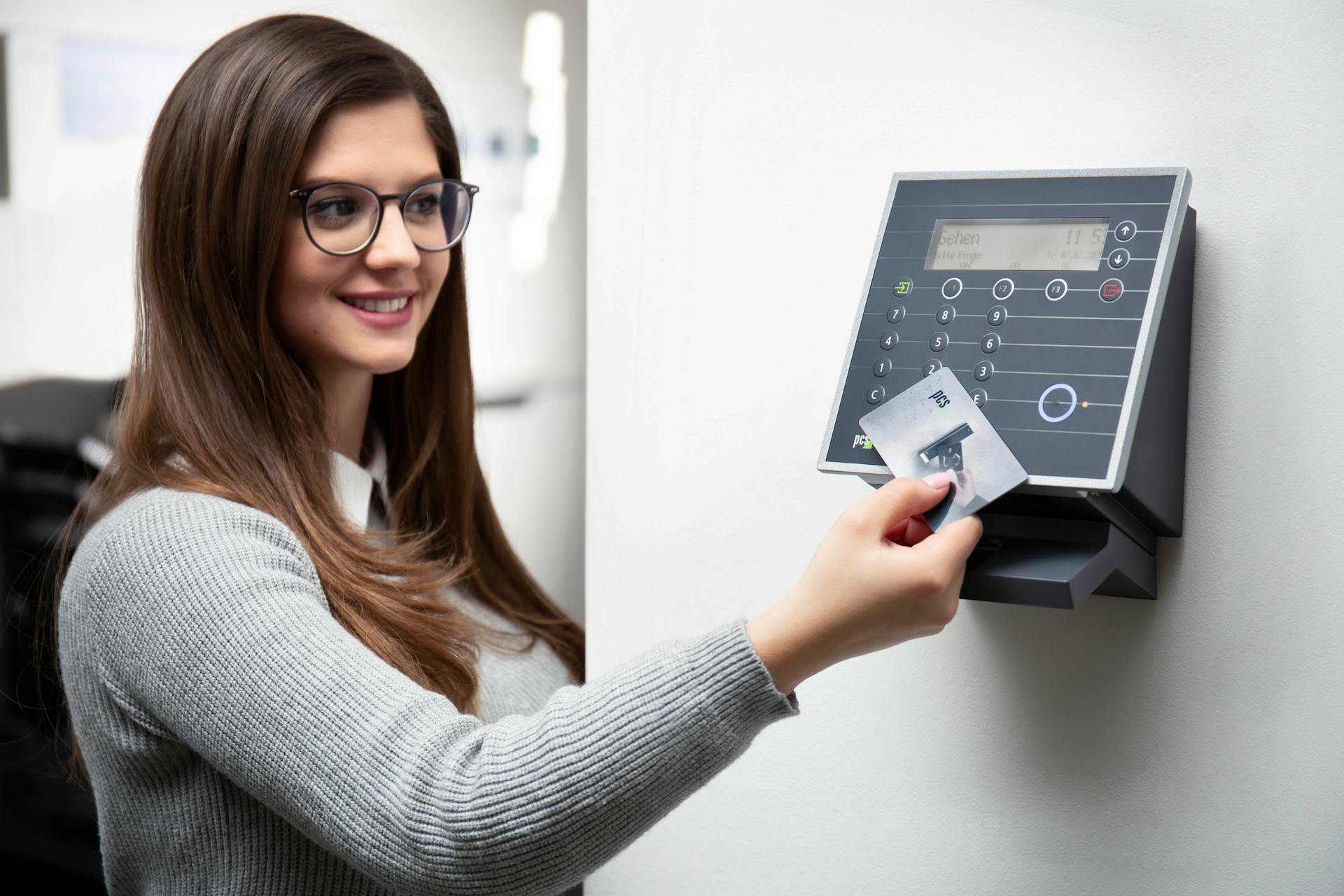
HIPAA access control is a critical component of protecting sensitive patient information. The HIPAA Security Rule requires covered entities to implement administrative, technical, and physical safeguards to ensure the confidentiality, integrity, and availability of electronic protected health information (ePHI).
Implementing HIPAA access control helps prevent unauthorized access to ePHI. This includes restricting access to authorized users, enforcing strong passwords, and monitoring user activity.
A well-implemented HIPAA access control system can reduce the risk of data breaches and protect your business from costly fines. According to the HIPAA Journal, a single data breach can cost a healthcare organization up to $1.6 million in fines and damages.
You might like: Ephi Hipaa
HIPAA Access Control Requirements
HIPAA Access Control Requirements are in place to ensure that only authorized individuals can access electronic protected health information (ePHI). Organizations must implement technical safeguards to protect ePHI, including an access control system.
The HIPAA Security Rule requires organizations to restrict access based on need-to-know, ensuring that ePHI is only accessible to those individuals who need access to perform their job duties. This means establishing roles and responsibilities and only granting access to those individuals who need access to perform their job duties.
Organizations must establish a system of unique user identification, assigning a unique name and number to each user, to help ensure that only authorized individuals can access ePHI. This helps prevent unauthorized access to sensitive information.
In the event of an emergency, organizations must have an emergency access procedure in place to ensure that authorized individuals can still access ePHI. This procedure should be clearly outlined in the organization's policies and procedures.
Automatic logoff systems must be implemented to terminate sessions after a predetermined period of inactivity, helping to prevent unauthorized access to ePHI. Audit controls must also be in place to record and monitor access to ePHI, helping organizations identify and respond to inappropriate access.
Here is a list of the HIPAA Access Control Requirements:
- Restrict access based on need-to-know
- Establish unique user identification
- Implement an emergency access procedure
- Use automatic logoff systems
- Implement audit controls
Organizations must also have a process to grant and deny access to ePHI, ensuring that access is granted only to individuals with a business reason to use the information. Access must be revoked when no longer needed, and access must be regularly monitored to ensure it is granted and withdrawn in a timely manner.
For your interest: Access Control 6300v2
Why Your Business Should Care
Your business should care about HIPAA access control because it's not just about healthcare providers. Many organizations, like billing companies and IT service providers, qualify as HIPAA business associates and must comply with specific rules.
Business associates must safeguard ePHI they receive from covered entities, which can be a complex and time-consuming task. This is a responsibility that can't be taken lightly.
Agents and brokers who sell or manage health plans are also subject to HIPAA regulations, specifically regarding the security of ePHI they handle. This includes protecting sensitive information from unauthorized access.
Employers who offer health plans to their employees may need to implement HIPAA access controls to protect employee health information. This is crucial for maintaining trust and avoiding costly fines.
Failing to implement adequate safeguards for ePHI can result in significant fines and reputational damage. It's a risk that's not worth taking.
Broaden your view: Hipaa Business Continuity
The 3 Pillars
The 3 Pillars of HIPAA Access Control are the foundation of a robust security system. These pillars work together to ensure that only authorized individuals can access electronic Protected Health Information (ePHI).
Authentication is the first pillar, ensuring that users are who they claim to be. This can be done through methods like usernames and passwords, biometric verification, or smart cards. Think of it like a digital ID check at the entrance.
Usernames and passwords are still widely used, but consider implementing strong password policies and multi-factor authentication (MFA) for added security. This can include something an individual knows (like a password) and something they have (like a security token).
Authorization is the second pillar, defining what actions a user can perform once authenticated. This is like assigning specific roles and permissions within a secure building. Permissions, privileges, access control lists (ACLs), and role-based access control (RBAC) are all ways to determine what actions a user can take on ePHI data.
Here's a breakdown of these authorization methods:
- Permissions: Define specific actions users can take on ePHI data (e.g., read, edit, delete).
- Privileges: Assign broader access levels based on job roles (e.g., claims adjusters need different access than marketing personnel).
- Access Control Lists (ACLs): Specify who can access specific data resources.
- Role-Based Access Control (RBAC): Grant access permissions based on pre-defined user roles (e.g., “claims processor” role has specific access to claims data).
Audit and Monitoring is the third pillar, keeping a watchful eye on user activity. This is like security cameras within the secure building. Security Information and Event Management (SIEM) systems track user activity and system events, allowing real-time detection of suspicious behavior.
Consider reading: Hipaa Security Services
Your Roadmap
Implementing a robust access control system is key to demonstrating a proactive approach to HIPAA compliance. This safeguards ePHI and minimizes the risk of costly violations and reputational damage for your organization.
By implementing these layers of protection, you can significantly reduce the risk of HIPAA violations. A robust access control system is essential for safeguarding ePHI.
You can demonstrate a proactive approach to HIPAA compliance by implementing a robust access control system. This proactive approach helps protect your organization from costly violations and reputational damage.
Consider reading: Risk Control Report
Physical Security
Physical security is a crucial aspect of HIPAA access control. HIPAA physical security compliance is based on four basic parameters: Facility Access Controls, Workstation Use, Workstation Security, and Devices and Media Controls.
To ensure compliance, physical inspections should be conducted regularly with constant safeguarding, timely staff training and interviews, and random technical checks of workstations. This includes inspecting the main server and networks for any malware or loopholes.
Documentation of the gathered information and auditing of the process from time to time is also essential to enhance the credibility of the system. A cloud-managed, modern access control system can add three security measures beyond HIPAA compliance: managed access, real-time audit, and remotely disabling physical access.
Take a look at this: Security Standards Hipaa
Build Your Fortress?
Building your physical security fortress requires a solid foundation. Consulting with a HIPAA compliance expert can help you tailor an access control plan that meets your organization's specific needs.
A well-planned access control system is crucial to ensuring your business remains HIPAA compliant. Consulting with an expert can help you identify any gaps in your current security posture.
A HIPAA compliance expert can assess your current security posture and recommend best practices to ensure your business remains compliant. They can also help you create a plan that meets your organization's specific needs.
Your access control plan should be tailored to your organization's unique needs. A HIPAA compliance expert can help you create a plan that takes into account your specific security requirements.
You might enjoy: Hipaa Compliance Plan
Physical Security Procedure
Physical security is a crucial aspect of HIPAA compliance, and it's based on four basic parameters: Facility Access Controls, Workstation Use, Workstation Security, and Devices and Media Controls.
To ensure physical security compliance, physical inspections from time to time are necessary, along with constant safeguarding, timely staff training and interviews, random technical checks of workstations, and main server and networks inspection for any malware or loopholes.
Documentation of gathered information and auditing of the process from time to time is also essential to enhance the credibility of the system.
Facility access control is a critical aspect of physical security, and it requires limiting authorized access to sensitive areas. Key card systems are often used to achieve this, but they may not be sufficient to comply with the standard.
In fact, most access control systems and offices might not be complying with the standards. Key card systems can be easily compromised, and unauthorized personnel can gain access to sensitive areas.
A cloud-managed, modern access control system can add three security measures to improve physical security: managed access, real-time audit, and remotely disable physical access.
Here are the benefits of a cloud-managed access control system:
- Managed access: You decide which access level an employee, freelancer, visitor or client has and which doors should be accessible for this access group.
- Real-time audit: At any time you can pull a report of real-time access events, including unsuccessful, unauthorized, or denied requests.
- Remotely disable physical access: Limit access to your facility remotely by disabling access from your smartphone instantly.
Access Control Process
The access control process is a crucial step in ensuring the confidentiality, integrity, and availability of protected health information (PHI). This process involves a series of steps that ensure only authorized individuals can access PHI.
According to the HIPAA Security Rule, the access control process must be implemented to restrict access to electronic protected health information (ePHI) to only those who need it to perform their job functions.
To achieve this, covered entities must implement authentication and authorization mechanisms to verify the identity of users and ensure they have the necessary permissions to access specific ePHI.
Authentication mechanisms, such as passwords or biometric scans, are used to verify the identity of users, while authorization mechanisms, such as role-based access control, determine what actions a user can perform on ePHI.
For example, a healthcare provider may implement a role-based access control system where users are assigned different roles, such as "doctor" or "nurse", which determine what ePHI they can access and what actions they can perform.
The access control process must also be regularly reviewed and updated to ensure it remains effective in preventing unauthorized access to ePHI.
Discover more: Phi under Hipaa
Frequently Asked Questions
What are the three 3 types of access control?
There are three main types of access control: DAC, MAC, and RBAC, each offering a different approach to managing user access. Understanding the differences between these three types is crucial for implementing effective access control systems.
What is the HIPAA facility access control policy?
Our HIPAA facility access control policy ensures that only authorized individuals can access electronic Protected Health Information (ePHI) by implementing access controls as required by the HIPAA Security Rule. This policy outlines the procedures for granting and revoking access to our facilities and systems to maintain the confidentiality, integrity, and availability of ePHI.
Sources
- https://rublon.com/blog/hipaa-compliance-access-control-authentication/
- https://www.totalhipaa.com/what-is-access-control-protecting-your-business/
- https://www.getkisi.com/guides/hipaa-compliance
- https://www.tldsystems.com/hipaa-right-access-rule
- https://www.mintz.com/insights-center/viewpoints/52541/2024-12-30-ocr-proposes-sweeping-hipaa-security-rule-amendments
Featured Images: pexels.com


